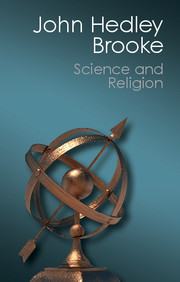Book contents
- Frontmatter
- Dedication
- Contents
- Acknowledgments
- Introduction
- I Interaction between Science and Religion: Some Preliminary Considerations
- II Science and Religion in the Scientific Revolution
- III The Parallel between Scientific and Religious Reform
- IV Divine Activity in a Mechanical Universe
- V Science and Religion in the Enlightenment
- VI The Fortunes and Functions of Natural Theology
- VII Visions of the Past: Religious Belief and the Historical Sciences
- VIII Evolutionary Theory and Religious Belief
- Postscript Science and Religion in the Twentieth Century
- Bibliographic Essay
- Sources of Quotations
- Index
Introduction
Published online by Cambridge University Press: 05 June 2014
- Frontmatter
- Dedication
- Contents
- Acknowledgments
- Introduction
- I Interaction between Science and Religion: Some Preliminary Considerations
- II Science and Religion in the Scientific Revolution
- III The Parallel between Scientific and Religious Reform
- IV Divine Activity in a Mechanical Universe
- V Science and Religion in the Enlightenment
- VI The Fortunes and Functions of Natural Theology
- VII Visions of the Past: Religious Belief and the Historical Sciences
- VIII Evolutionary Theory and Religious Belief
- Postscript Science and Religion in the Twentieth Century
- Bibliographic Essay
- Sources of Quotations
- Index
Summary
In a classic discussion of the origins of modern science, the historian Herbert Butterfield drew a much-quoted parallel. Such was the impact of the seventeenth-century Scientific Revolution that the only landmark with which it could be compared was the rise of Christianity. In shaping the values of Western societies, science and the Christian religion had each played a preeminent part and made a lasting impression. Exaggerated or not, such comparisons raise an obvious question. What was the relationship between these powerful cultural forces? Were they complementary in their effects, or were they antagonistic? Did religious movements assist the emergence of the scientific movement, or was there a power struggle from the start? Were scientific and religious beliefs constantly at variance, or were they perhaps more commonly integrated, both by clergy and by practicing men of science? How has the relationship changed over time?
Such questions are easier to formulate than to answer. Since the seventeenth century every generation has taken a view on their importance without, however, reaching any consensus as to how they should be answered. Writing some sixty years ago, the philosopher A. N. Whitehead considered that the future course of history would depend on the decision of his generation as to the proper relations between science and religion – so powerful were the religious symbols through which men and women conferred meaning on their lives, and so powerful the scientific models through which they could manipulate their environment. Because every generation has reappraised the issues, if not always with the same sense of urgency, there has been no shortage of opinion as to what that proper relationship should be.
- Type
- Chapter
- Information
- Science and ReligionSome Historical Perspectives, pp. 1 - 21Publisher: Cambridge University PressPrint publication year: 2014

